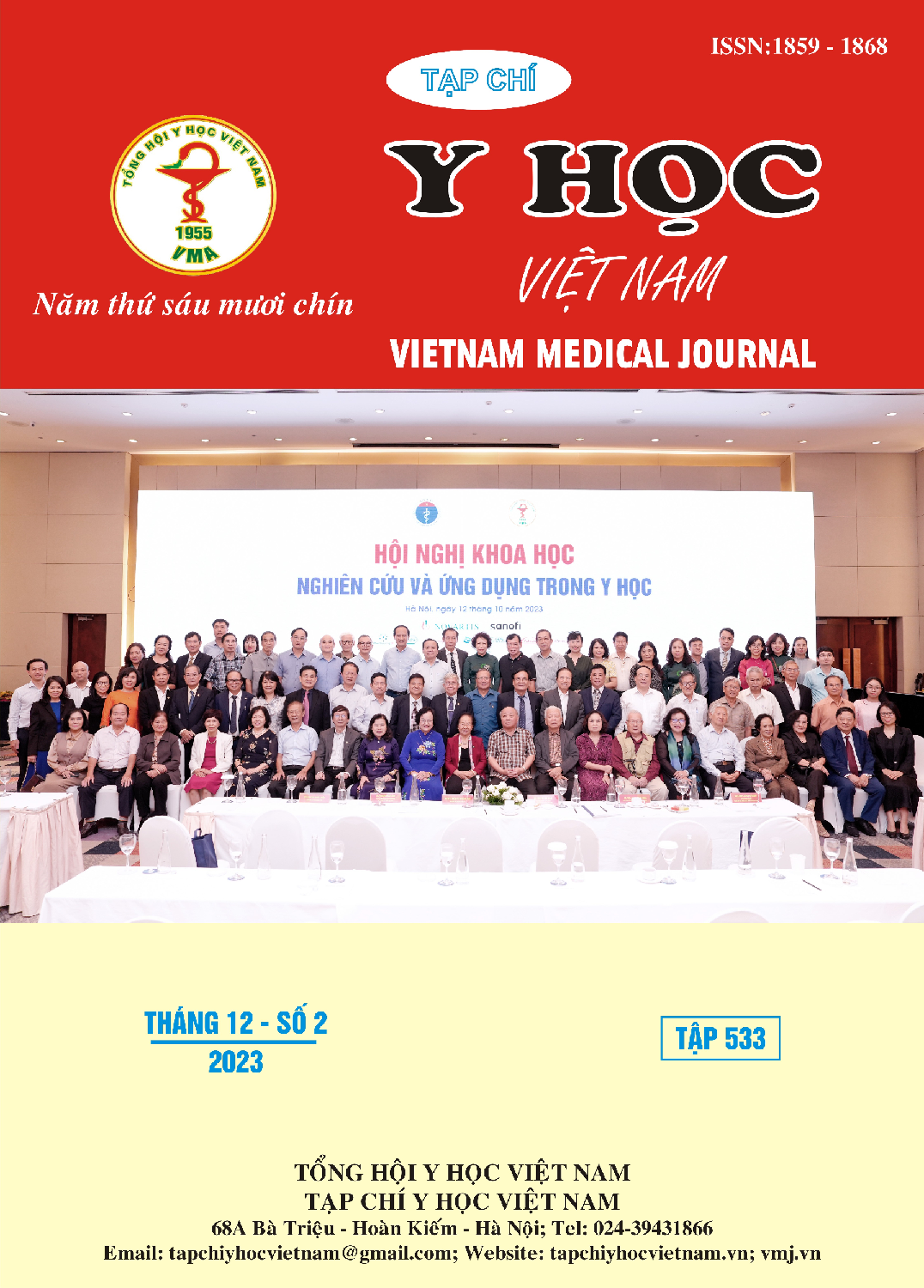THORACOSCOPIC SURGERY TO REMOVE BENIGN ESOPHAGEAL LEIOMYOMA AT HA NOI MEDICAL UNIVERSITY HOSPITAL
Main Article Content
Abstract
Objectives: The study aimed to evaluate the results of thoracoscopic surgery to remove benign esophageal leiomyoma at Hanoi Medical University Hospital. Methods: A retrospective descriptive study on 31 patients who were diagnosed with esophageal benign leiomyoma based on medical examination, clinical examination, esophagoscopy, esophageal endoscopic ultrasound and chest computed tomography, treated at the Department of General Surgery, Hanoi Medical University Hospital, during the period from January 2016 to December 2022. Results and discussion: Laparoscopic surgery was used to remove benign esophageal leiomyomas from 31 individuals, with an average age of 49.2 (ranging from 24 to 66 years old). Seven individuals (22.58%) were asymptomatic, while 24 patients (77.42%) exhibited symptoms. In the top third of the thoracic oesophagus, middle third, and lower third, respectively, the rates of tumours were 9.68% (3 patients), 64.52% (20 patients), and 25.8% (8 patients). Average tumor size was 32.32 ± 9.76 mm (20–57 mm). All patients underwent right thoracoscopy. In 12 cases (38.7%), 3 trocarts were utilised; in 19 cases (61.3%), 4 trocarts were used. There were no complications or serious complications during and after surgery. The surgery took, on average, 114.03 ± 29.87 minutes (between 80 and 180 minutes). The typical hospital stay 8.35 ± 3,67 days (4 days-24 days). Conclusions: Thoracoscopic surgery to remove benign esophageal leiomyoma is a safe procedure with high success rate, low risks, and minimal postoperative problems.
Article Details
References
2. Giovanna Mainieri Breedy1, José AlbertoMainieri Hidalgo, et al. Esophageal leiomyoma, experience with nine surgical patients. Acta méd costarric. 2012; 54 (3): 165 - 169.
3. Christopher J, Mutrie, Dean M, et al. Esophageal Leiomyoma: A 40 - Year Experience. Ann Thorac Surg. 2005; 79: 1122 - 11255.
4. Yun - Xi Wang, Jing Zhang, Yi Liu, et al. Diagnosis and comprehensive treatment of esophageal leiomyoma: clinical analysis of 77 patients. Int J Clin Exp Med. 2015; 8 (10): 17214 - 17220.
5. Diego Ramos, Pablo Priego, Magdalena Coll, et al. Comparative study between open and minimally invasive approach in the surgical management of esophageal leiomyoma, Rev esp enferm dig (Madrid). 2016; 108 (1): 8 - 14.
6. Everitt N J, Glinatsis M, McMahon M J. Thoracoscopic enucleation of leiomyoma of the oesophagus, Br J SurG. 1992; 79: 643.
7. Shin S, Choi YS, Shim YM, Kim HK, Kim K, Kim J. Enucleation of esophageal submucosal tumors: a single institution’s experience. Ann Thorac Surg. 2014; 97: 454 - 9.
8. Bardini R, Segalin A, Ruol A, Pavanello M, Peracchi A. Videothoracoscopic enucleation of esophageal leiomyoma. Ann Thorac Surg 1992;54(3):576-7.
9. Kent M, d’Amato T, Nordman C, et al. Minimally invasive resection of benign esophageal tumors. J Thorac Cardiovasc Surg. 2007; 134: 176 - 181.
10. Mutrie C. J, Donahue D. M, Wain J. C, et al. Esophageal leiomyoma: a 40 - year experience. Ann Thorac Surg. 2005; 79: 1122- 1125.


